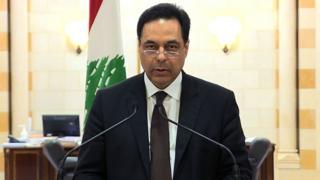 Image copyright
AFP
Image copyright
AFP
Lebanon's government has resigned amid mounting anger over the explosion on Tuesday that devastated parts of Beirut and left more than 200 people dead.
The announcement was made in a national TV address by Prime Minister Hassan Diab on Monday evening.
Many people have accused the country's leaders of culpability through their alleged negligence and corruption.
Protesters have taken to the streets and clashed with police for a third straight day.
The massive blast was caused by the detonation of 2,750 tonnes of ammonium nitrate stored unsafely at the port for years.
On Monday the death toll from the explosion rose to 220 with 110 people still missing, Beirut city governor Marwan Abboud was quoted by the al-Marsad Online news website as saying.
Many foreign workers and lorry drivers were among the missing, he told Al Jadeed TV channel.
The huge blast damaged buildings in a radius of several kilometres in Beirut, leaving more than 200,000 homeless or living in homes with no windows or doors.
On Monday police fired tear gas at angry protesters during tense clashes in the capital.
Image copyright Reuters Image caption Police and protestors clashed in Beirut on MondayWhy did the government resign?
Discontent in Lebanon has been brewing for years. In late 2019, a plan to tax Whatsapp calls spilled over into mass protests against economic turmoil and corruption, which eventually led to the government's resignation.
Coronavirus had curbed the protests, but the financial situation has continued to worsen and last Tuesday's explosion was seen by many as the deadly result of years of corruption and mismanagement.
The government's plans to investigate were not enough for many who have lost all faith in the political elite. Before the cabinet's resignation, a number of ministers had already offered to step down.
But the end of this government does not necessarily mean an end to the anger. Last year's protests led to the formation of the government which has now been forced to step down over the same accusations of corruption.

 5 years ago
535
5 years ago
535 

